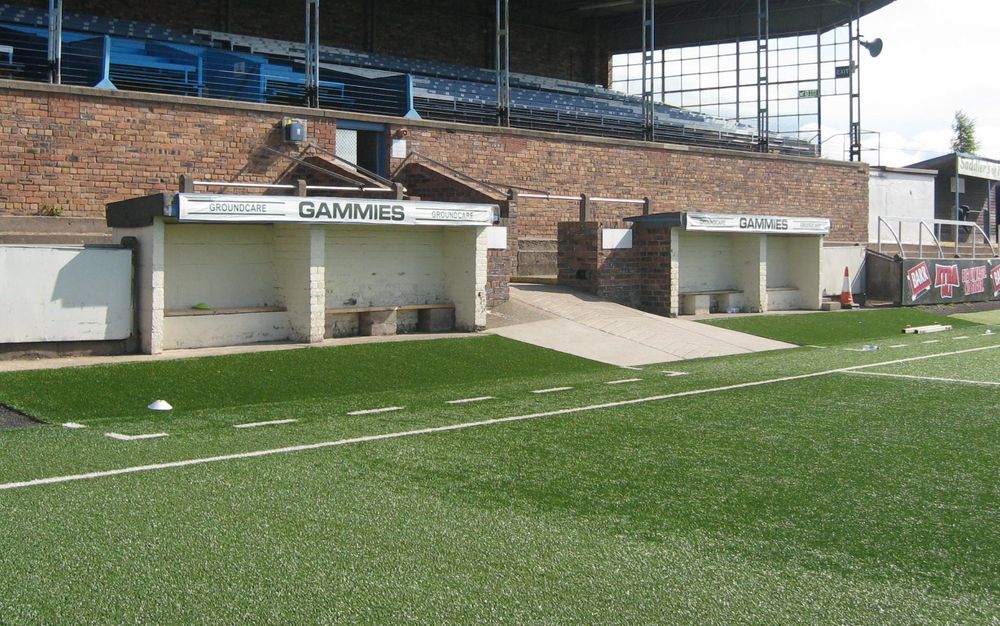
Striker Mick Tuohy became part of a lethal trio of attackers at Kidderminster Harriers with Kim Casey and Paul Davies after moving to Aggborough in March 1984.
Tuohy started his career with Walsall and then signed for Redditch United in the Southern League before being sold to Southend United in 1979.
He made 21 appearances for the Shrimpers and scored 4 goals before returning to the Midlands and signing for Worcester City in the Alliance Premier League.
He went on to score 84 times for City in 203 games before moving to Kidderminster.
He represented the FA XI and was a Middlesex Wanderer and a touch unlucky not to have won England semi-professional honours like his fellow strikers, Kim Casey and Paul Davies.
He played over 350 times in total for Harriers, scoring more than 100 goals, and then had spells with Cheltenham Town, Stafford Rangers and Solihull Borough.
He turned to management with Southern League Worcester City as assistant manager and then with former club Redditch as manager.
In August 2003, Tuohy was back at Worcester as first-team coach under former Kidderminster team-mate John Barton.
Barton had asked Tuohy to be his assistant when he took over at Burton Albion in 1994, but he declined the offer to link up with Halesowen Town.
He later bought and ran a pub in the Black Country.
Midfielder Peter Morris was rated as one of Mansfield Town`s greatest post-war discoveries.
He was becoming a legend with the Field Mill faithful after making his debut under former England star Raich Carter at 17 and becoming one of the youngest captains the Stags have ever had.
Then in 1968, after eight years as the bedrock of the team and apparently a fixture for the remainder of his career, he was suddenly sold to First Division Ipswich Town for the giveaway price of £15,000.
He had made over 300 appearances for Mansfield and chipped in with more than 50 goals.
The Stags` fans were shell-shocked, not only by him leaving, although none could expect him to turn down the offer of higher-grade football, but by the ridiculously low fee the Board of Directors accepted.
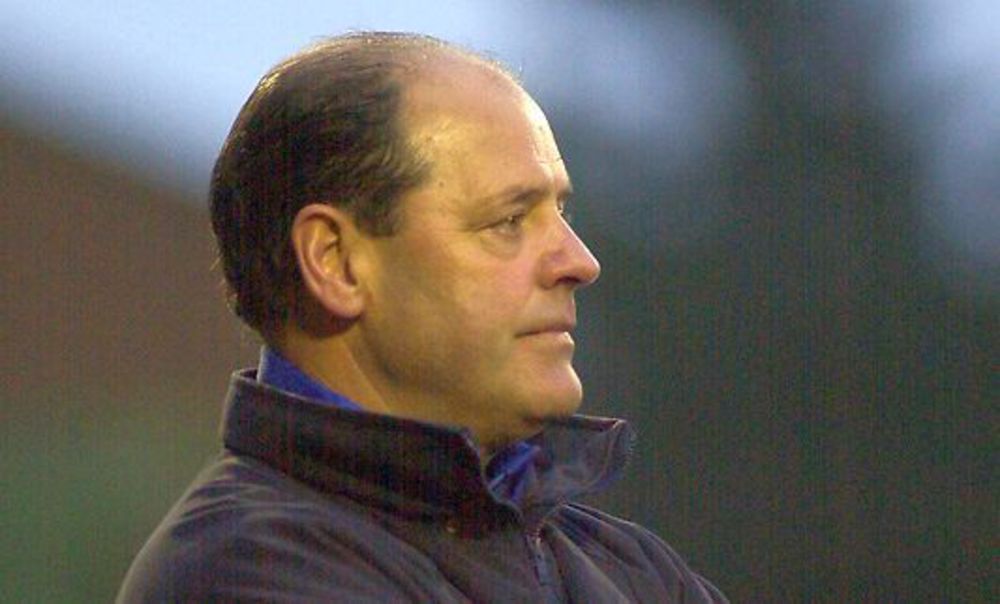
Peter Morris (Kappa Sports>
Morris was also a great success at Portman Road as Bobby Robson began to build a terrific squad that enjoyed battling near the top of the table and play European football.
After making over 250 appearances for the Tractor Boys, Morris moved to fierce rivals Norwich City for £60,000 in 1974 where he played 66 times.
He returned to Mansfield in July 1976 as player-manager until February 1978.
He took the Stags to Division Two for the first time in their history, but when he couldn`t prevent relegation the following term, he was sacked.
After a spell as assistant manager at Newcastle United, Morris joined Peterborough United as manager in February 1979 until May 1982, and then had short spells with Crewe Alexandra, Southend United and Nuneaton Borough, then in the Alliance Premier League.
However, he was sacked just six months into the job, with Boro sitting bottom of the table.
But his sacking came just three days after he had taken Boro to the First Round of the FA Cup with a money-spinning home tie against Fourth Division Burnley.
After spells coaching Saudi Arabian side Aajar Sporting and then Leicester City, Morris took over as manager of another Conference side, Kettering Town, in June 1988.
He enjoyed four reasonably successful seasons at Rockingham Road, coming extremely close to winning the Conference on a couple of occasions and also enjoying FA Cup runs to the Fourth Round against Charlton Athletic in his first season in charge, led by the striking duo of Robbie Cooke and Ernie Moss, and then in 1991/92 to the Third Round against Blackburn Rovers.
He moved to Boston United in 1992 and then was assistant manager at Northampton Town before taking over at Southern League King`s Lynn in August 1995.
He guided Lynn to promotion from the Southern Midland Division in his first season in charge and then to comfortable positions in the Premier Division before leaving in May 1998 to return to Kettering.
He had a difficult time of it second time around and left after the Poppies were relegated to the Southern League in 2001.
He re-joined King`s Lynn from May 2002 until November 2003, having helped out as caretaker boss at the end of the 2001/02 season and then turned to scouting.
John Ryden was born in Dunbartonshire and played junior football for Denhny Juveniles and Duntocher Hibernians prior to signing for Alloa as a part time player in May 1950.
He remained at the Scottish Division ‘B’ club until February 1954, when he was offered full-time terms by Accrington Stanley - then members of the old Third Division (North).
A virtual ever-present for Accrington, netting once in 80 outings, he arrived at Tottenham Hotspur for a reputed £8,400 fee in November 1955.
Following a spell in our Combination side he scored on his senior debut at Preston North End on Easter Monday 1956 and although on Spurs books for five and a half years, his senior opportunities were condensed into a three-year period, with the last of his 68 first-team appearances coming against Leeds United in March 1959.
Ryden captained Spurs` second string throughout the 1959/60 and 1960/61 seasons, taking his Combination appearance total to 118 matches.
In June 1961, he signed for Watford, re-joining former White Hart Lane team-mates Tommy Harmer and Alf Stokes.
Ryden skippered Watford briefly after Cliff Holton`s departure, and his only Hornets` goal sparked a late rally which saw Queens Park Rangers beaten after they had led 2-0.
After 24 games for the Hertfordshire outfit, he left to start a three-year spell at Southern League club Romford during October 1962 and then had stints at Hastings United and Tunbridge Wells until 1966 when he was appointed as player-manager of Southern Division One club Bexley United until 1968.
On leaving the game, Ryden stayed in Kent, working for a Maidstone-based finance company while living at Orpington.
He died in August 2013 at the age of 82.
Bobby Etheridge started his career with home-town club Gloucester City, joining brother Dick.
Under Doug Hunt, Etheridge was the leading scorer in the 1954/55 and helped Gloucester to win the Southern League Cup in 1955/56.
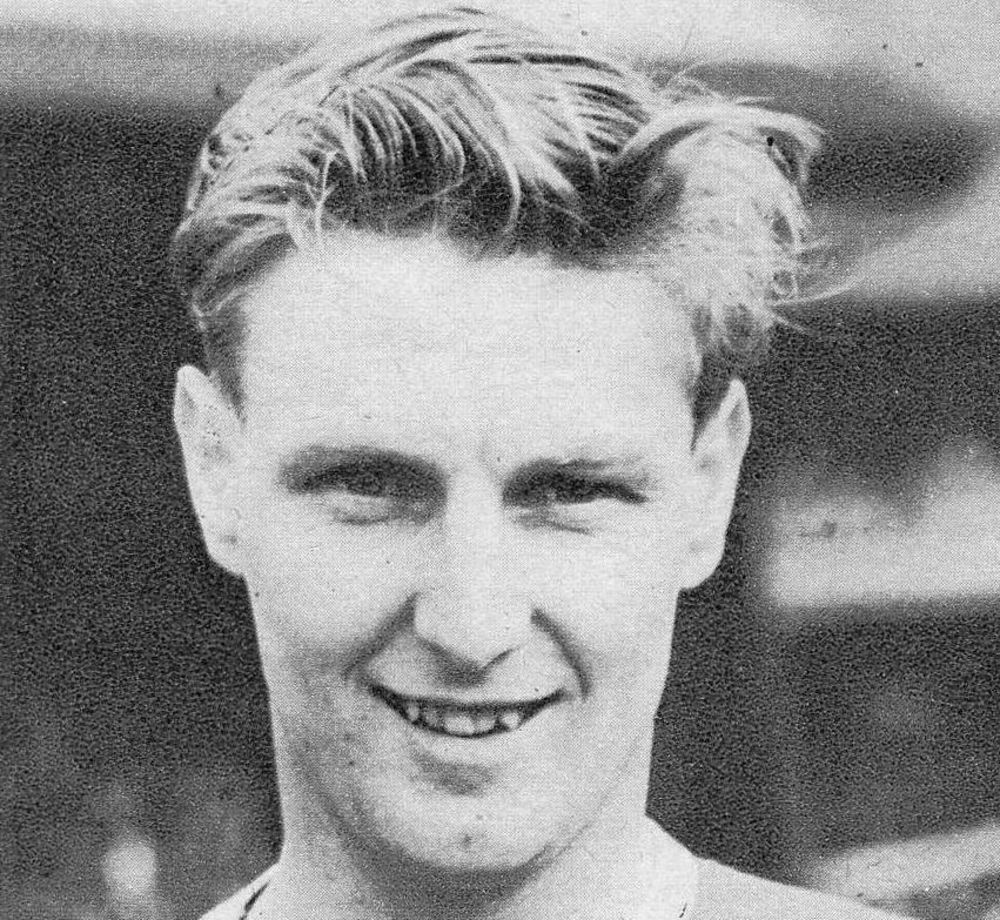
Bobby Etheridge
The wing-half moved to Second Division Bristol City in September 1956 and made 259 League appearances and scored 42 goals.
He was released in 1966 and joined Southern League Premier Division side Cheltenham Town as player-manager.
He spent seven years at Cheltenham as player-manager then manager to November 1973 and helped the Robins achieve fourth place in the Southern Premier Division in 1967/68.
They finished only four points behind champions Chelmsford City and the team included Ron Radford, scorer of one of the most famous FA Cup goals for Hereford United against Newcastle United in 1970.
But the following campaign they finished fourth-from-bottom and were relegated.
The Robins finished third in three consecutive seasons before Etheridge left to re-join Gloucester City, this time as manager, in 1973.
He had two spells as manager 1973 to 1976 full time and then again in 1985 temporarily as caretaker.
He ended his managerial career with local Gloucester team, Longlevens.
He also played cricket as a wicketkeeper and batsman for Gloucestershire between 1954 and 1961.
Kevan Bowen took over as manager of Stafford Rangers in October 1995 after they had failed to gain a point in the Southern Premier Division.
The local man made an immediate impact and achieved satisfactory results in the second half of the season, but the damage had already been done at the start and the club was relegated for the second successive season.
Bowen joined Rangers after enjoying a successful four years at Bridgnorth Town, leading them to a fifth-place finish in 1994/95.
He had initially been in charge of Bridgnorth`s reserve side and then had two years as first-team boss.
As a player, Bowen was part of a Welsh League and cup `double` side and took Prestatyn Town to win their first major honour.
Don Gowans was a much-respected manager in the Hampshire area in the 1980s and 1990s.
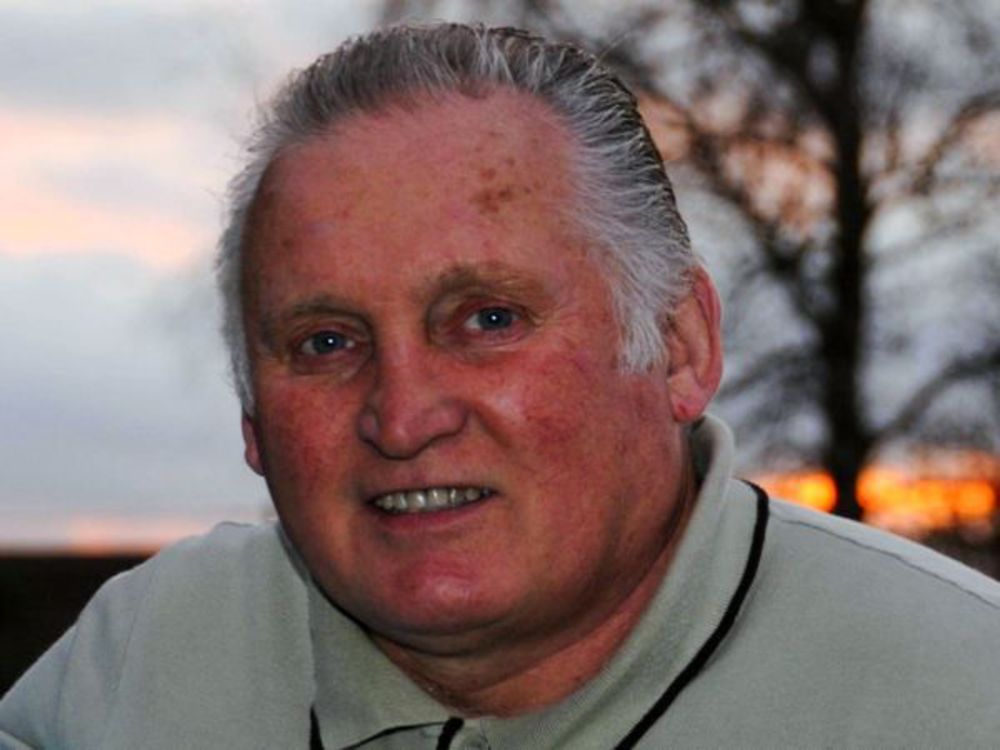
Don Gowans
He managed North End Old Boys before moving to Sholing reseves and Pirelli General, where he had also been a player.
He then had spells as manager with AFC Totton and then Fareham Town in the Southern League Premier Division.
With Fareham, he was desperately unlucky to be relegated from the Southern Premier in 1988/89 having obtained 51 points – a point away from safety.
That season they also reached the First Round of the FA Cup, where they led Fourth Division Torquay United 2-0 at Plainmoor with 10 minutes to go, only to be pulled back to 2-2 and eventually lost 3-2 in the replay at home.
Gowans managed then-Wessex League side Eastleigh from the start of the 1990/91 season to midway through 1994/95 and twice led them to the last 32 of the FA Vase - a round they only reached three times - and to the Wessex League Cup final in 1991/92.
He passed away in a nursing home in June 2015.
Simon Redhead started out as an apprentice with Stockport County.
He then turned out for Colne Dynamoes before moving to the Midlands where he had spells with the likes of Bromsgrove Rovers, Evesham United, Alvechurch and Studley.
He then moved into management in 2009 with Alvechurch, guiding them to their highest finish in the Midland Alliance two years running, including a Birmingham Senior Cup final appearance and winning two Worcester Senior Urns.
He then had a spell managing Redditch United in the Conference South in 2010/11 but couldn`t save them from relegation to the Southern League.
Redhead was appointed Reds` boss in February but failed to record a victory in his 15 games in charge and he was sacked at the end of the campaign.
He scouted for a number of Conference National sides before somewhat surprisingly being offered the chance to return to the Redditch hot seat in May 2012.
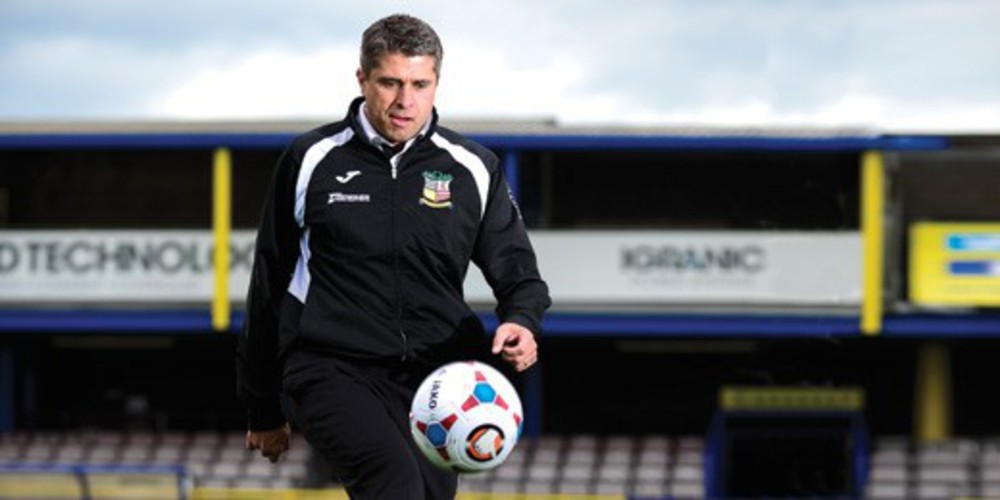
Simon Redhead
After a couple of seasons back in charge, Redhead left the Valley Stadium and went on to become assistant manager of both Solihull Moors and Alvechurch before moving onto the Board of Directors at Lye Meadow.
Although christened John Brindley, the Nottingham-born defender was always known as `Bill`.
A former England Schoolboy and Youth international, he began his career with Nottingham Forest in 1964.
Three years later he made headlines by scoring only 10 seconds after coming on as a substitute in a match against Southampton.
He then went on to make over 250 appearances for Notts County, twice being part of promotion winning sides, before joining Gillingham in 1976, finally finishing with 3 goals to his name in 288 games.
He signed for then-Southern Premier Division club Grantham Town in September 1977, but his first period at London Road lasted just into the New Year and he moved on to have spells with Burton Albion and then Alfreton Town.
The arrival of his former Notts County team-mate, Jon Nixon, as player-manager at Grantham in the summer of 1981, saw Brindley`s return to the now Northern Premier League club.
He left the Gingerbreads at the end of the 1982/83 season and entered into management, firstly with Notts Senior League side Meadows Albion (now Greenwood Meadows), then Boston Town, who he led to the Central Midlands League championship success and then he moved to another CML side, Heanor Town.
Brindley then took over as manager of West Midlands (Regional) League side Ilkeston Town and led them to promotion to the Southern Midland Division in 1993/94.
Brindley then took the Robins straight through to win promotion to the Southern Premier Division in 1994/95.
A disastrous start to the following season, though saw Ilkeston struggling at the foot of the table with Brindley resigning in October 1995.
He then spent several seasons in charge of Northern Counties East League side Arnold Town.
Sadly, in October 2007, Brindley lost his two-year battle with liver disease and died at the age of 60.
Karl Elsey was an attacking midfielder who enjoyed a lengthy and well-travelled playing career.
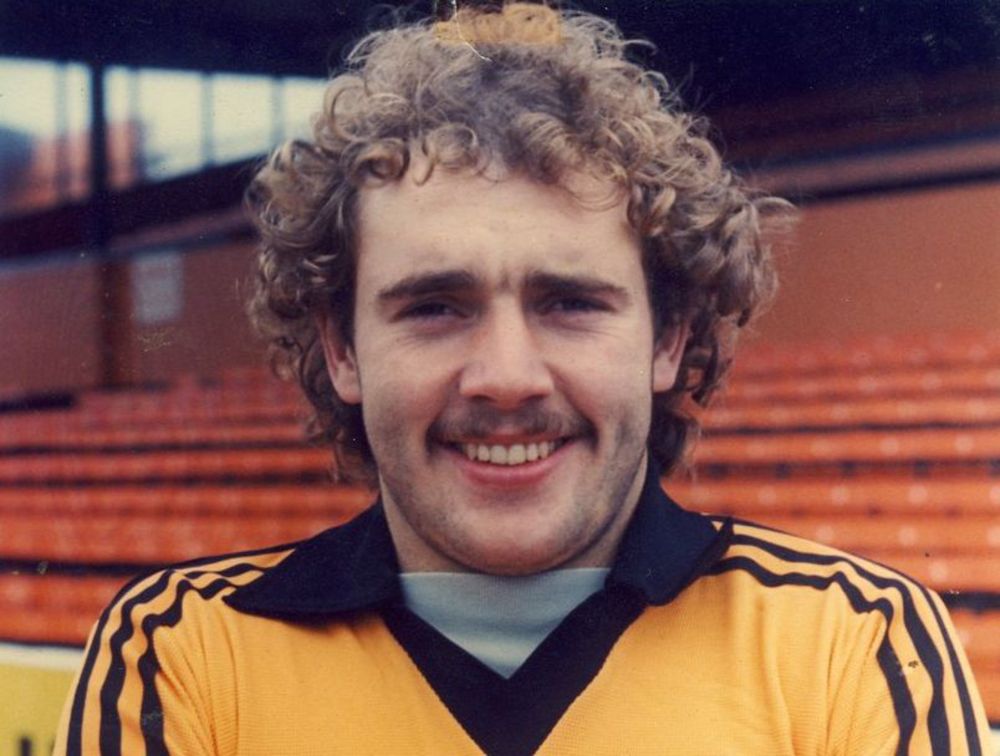
Karl Elsey
He started out with Pembroke Borough before signing for home-town club Swansea City in 1978.
But he returned to Pembroke without managing to break into the senior side at the Vetch.
In January 1979, he was handed a second opportunity at professional level with Queens Park Rangers, and he went on to play 7 first-team games before returning home to Wales in the summer of 1980 to join Newport County.
He laid down some roots with County, making 155 appearances and scoring 17 goals and also played in the European Cup Winners` Cup.
In September 1983, Elsey moved to Cardiff City and scored 5 goals in 65 games for the Bluebirds before moving on again, this time to Gillingham in May 1985.
He made over 150 appearances in all competitions for the Gills, with 13 goals, before he was on the move once again, this time to Reading where he managed 5 goals in 58 games.
He returned to Kent to join then-Fourth Division Maidstone United where he had a couple of years, making just under 100 appearances and scoring 7 goals.
He re-joined neighbours Gillingham in the summer of 1991 where he ended his League career, adding a further 27 games to his tally.
In March 1992, Elsey moved back into non-League football with Southern League South side Sittingbourne.
He moved to Braintree Town in December 1993 but returned to the Southern League with, briefly Ashford Town in February 1994 and then Hastings United a month later.
In September 1994 he signed for Kent League side Faversham Town but within weeks returned again to the Southern South Division with Margate.
In April 1995, Elsey was appointed as joint caretaker manager with Mark Weatherly following the resignation of Bill Roffey.
A month later, Elsey was announced as the new permanent boss at Hartsdown Park.
But Elsey was sacked in March 1996 and left to play for Kent League sides Ramsgate, Chatham Town and Lordswood.
His final fling as a player was with the `new` Maidstone United side, then in the Kent County League before hanging up his boots in September 1998 at the aga of 39.
Wing half Vic Crowe was born in South Wales but moved to Birmingham with his family when he was just two years old.
On leaving school, he played for Erdington Albion - the West Bromwich Albion nursery team - but signed for Aston Villa in 1951.
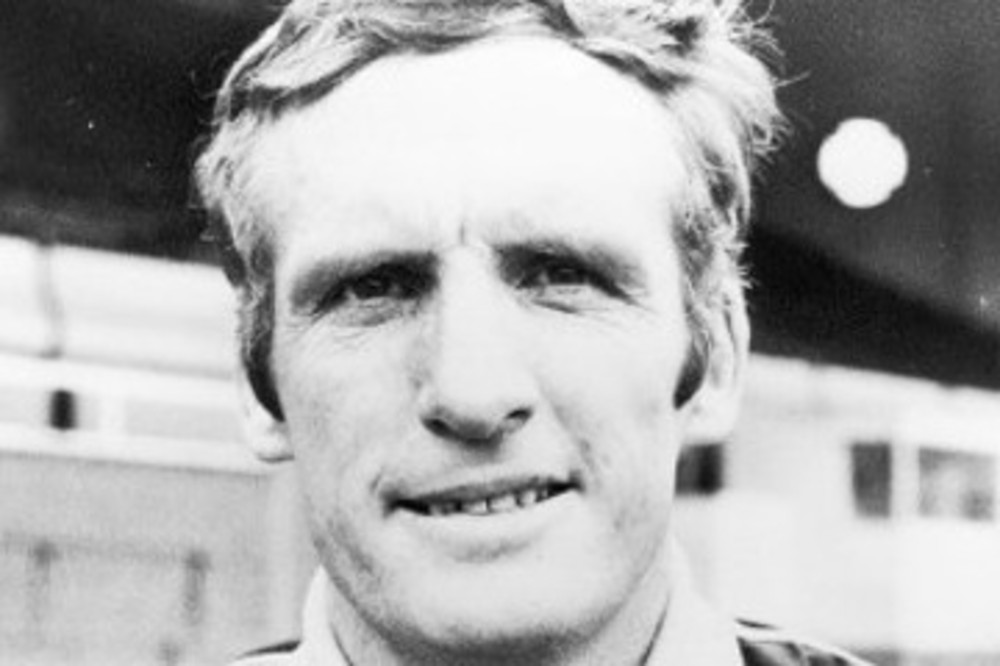
Vic Crowe
He established himself in the Villa team when Danny Blanchflower left the right-half berth at Villa for Tottenham Hotspur in 1954.
He missed the 1957 FA Cup Final due to injury but captained the side to the Second Division title in 1960 and League Cup Final success in 1961.
He was capped 16 times by Wales at full international level between 1958 and 1963 and was a member of their World Cup squad of 1958.
He made over 350 appearances for Villa, scoring 12 goals, and in July 1964, he signed for Peterborough United for a fee of £4,000 and his experience was pivotal to the record-breaking run to the FA Cup quarter finals in 1965 and League Cup semi-finals in 1966.
In the 1964/65 FA Cup run, Crowe skippered the side to wins over Arsenal and Swansea Town and was captain at Stamford Bridge in the quarter final clash against Chelsea. However, he was injured with a torn calf muscle in the first few minutes of the game and was carried off on a stretcher. He limped back on the pitch (no substitutes then) but by that time the Posh were already 3-0 down and Chelsea ran out convincing winners that day 5-1.
In the League Cup the following season Crowe led the side to the semi-finals of the competition and briefly ran the team when Gordon Clark became general manager.
That arrangement dropped before the 1966/67 season and Crowe left Posh to take charge of American side Atlanta Chiefs.
He re-joined Aston Villa as coach in 1969 and was appointed manager in 1970.
He steered Aston Villa to the League Cup Final in 1971 and to promotion in 1972 and then built the side that was later to win the League Cup and regain the club’s First Division status.
He was sacked in 1974 after Villa finished 14th in Division Two.
In 1975, Vic went to the United States to take part in the North American Soccer League, taking the manager’s position with Portland Timbers.
He brought a cast of English players with him, many of them young players from the Midlands area, and they proceeded to win the Western Division championship and advanced all the way to the North America Soccer League final, losing 2–0 to Tampa Bay Rowdies.
In their two home play-off games, Timbers` success forced the club to add temporary seating to accommodate their fans, and the team played before two crowds in excess of 30,000, totals unheard of in American soccer at the time.
Crowe stayed in Portland through the 1976 season before returning to England.
The Timbers beckoned again in 1980, however, and he returned for three more seasons in America before the Timbers club folded after the 1982 season.
Although his later teams never captured the success of that first year, he left an indelible mark on soccer in the Pacific Northwest by introducing thousands of Portland area residents to the joys of the game and today, Portland is a soccer hotbed.
In 1988, after a period out of the game, Crowe re-emerged as manager of Southern League Midland Division side Bilston Town for a year or so before going into retirement.
He died in January 2009, at the age of 76, after a long illness.
Sussex-born Tony Sitford joined Brighton & Hove Albion`s groundstaff as a teenager.
He turned professional in March 1959 and made his first-team debut in October 1960 in a League Cup tie away to Notts County.
A forward who could also play full-back, he made most of his 24 first-team appearances the following season, as well as scoring his second senior goal.
In February 1962, he put his side ahead after 15 seconds against Second Division leaders Liverpool at Anfield but Brighton lost 3-1, and Sitford was one of many players to leave the club at the end of the season.
He spent just over a year with Gravesend & Northfleet, during which he scored the goal that took his team through to the Fourth Round of the FA Cup, eliminating Third Division club Carlisle United on their own ground.
They had already beaten Chatham Town, Sutton United, Erith & Belvedere and Lewes to reach the First Round where they beat Fourth Division Exeter City, and then Isthmian Leaguers Wycombe Wanderers in the Second Round.
Gravesend drew 1-1 at Stonebridge Road against Second Division Sunderland before losing the replay 5-2 at Roker Park.
Sitford followed that with nearly six years with another Southern League club, Dartford, where he was player of the year for 1967/68.
He returned to Gravesend in 1969 and helped them finish third in 1970/71 to gain promotion to the Premier Division.
Sitford took over as manager in 1974 and led the team to the Southern Division One South title in 1974/75 and won the Southern League Cup in 1978.
The team`s performances in the Southern Premier Division were good enough to secure admission to the newly formed Alliance Premier League, in which they finished fifth in its inaugural season.
He left the club in 1980 and had a spell as manager of Welling United before beginning a long association with Kent-based club Corinthian, where his roles included team manager, director of football and groundsman and he led them into the Southern League until suffering relegation into the Kent League in 1991.
His official association with the club ended in 2012 at the age of 72.
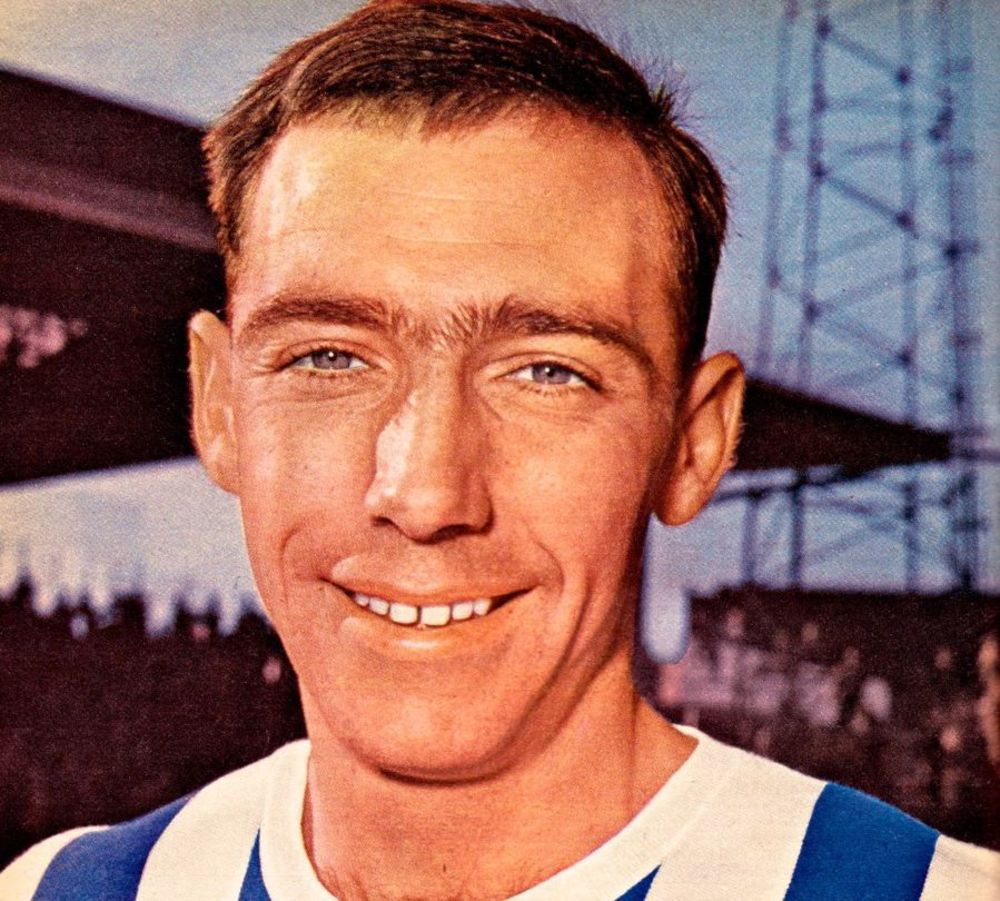
Harold Jarman
Harold Jarman was one of the now dying breed of people who played both professional football and professional cricket at the same time.
As a footballer, he built up an early reputation as a youngster with local sides Clifton Villa, Chippenham United, Bristol St George and Victoria Athletic.
It wasn`t long before Bristol Rovers took notice and he signed in the summer of 1959.
He went on to give the Gas great service, playing 452 matches and chipping in with 127 goals.
Indeed, playing on either flank, Jarman scored more goals for Rovers than anyone, except Geoff Bradford and Alfie Biggs, which was amazing for a winger.
At the same time, in the summer months, Jarman was a handy middle order batsman for Gloucestershire between 1961 and 1971.
After leaving Eastville, Jarman ended his League playing days with Newport County before enjoying an `Indian summer` with New York Cosmos in the North American Soccer League, who eventually replaced him with Pele!
He returned to England and played for then-Western League club Mangotsfield United and then, in 1976, took his first step into management when he was appointed player-manager of Portway Bristol for their debut season in Division One of the Western League.
He spent two years in charge of Portway Bristol, finishing in eighth place in the league during the 1976/77 season and seventh in 1977/78.
After four years out of the professional game, during which time he had been working as a carpenter, Jarman decided that he wanted to get back into full-time football and in February 1978 he successfully applied for the position of youth team coach at Bristol Rovers, replacing Colin Dobson.
Under Jarman's leadership, the Rovers youth team had their most successful period up to that point, finding success in both league and cup competitions.
During his spell in charge, they achieved their highest league position, progressed further than ever before in the FA Youth Cup, and twice won a prestigious international youth tournament in Tilburg, Netherlands.
In December 1979, the Bristol Rovers' manager Bobby Campbell was relieved of his duties following a poor run of results which had left the club near the bottom of the Division Two table.
The club appointed Jarman as caretaker manager while the vacant position was advertised, and applicants were interviewed.
During this spell the first team's performance improved and Jarman was rewarded by being given the job on a full-time basis.
The team's improvement in form continued until the end of the 1979/80 season, and they eventually finished 6 points clear of the relegation zone.
One of Jarman's first actions as manager was to re-appoint former Leeds United and England left back Terry Cooper to the coaching staff.
Cooper had been sacked a few months earlier by Jarman's predecessor, but the decision to bring him back to the club backfired on Jarman when the Bristol Rovers Board opted to replace Jarman as manager with Cooper almost as soon as the season ended.
Cooper initially kept Jarman on as his assistant manager, but fired him in September 1980, along with Bobby Campbell who was by this point the club's chief scout, in order to bring in his own coaching team.
Jarman subsequently held various coaching and scouting positions at a number of clubs including Norwich City, Blackburn Rovers and Manchester City.
Then in 1988 he was appointed as manager of Bath City, who had just been relegated from the Conference.
However, he lasted only until October 1988 and a year later, returned to Cossham Street as manager of Mangotsfield.
In 1991, Jarman achieved regional glory by taking the Western League Premier Division title ahead of runners-up Torrington.
Disappointingly, they were denied promotion to the Southern League as their ground failed to meet the grading requirements and Jarman left United and football in 1992.
Big, strong centre-back Paul Bowgett was captain of the history-making Wealdstone side of 1985 when they won both the FA Trophy and the Conference, the first ever club to achieve the non-League 'double'.
His career began with Letchworth Garden City, who he helped win promotion from the Athenian League to the Isthmian League in 1977.
However, after making 165 appearances for City, he was snapped up by Tottenham Hotspur later that year as they were looking for a replacement for Mike England.
But he failed to make the senior side and was allowed to leave to join Fourth Division Wimbledon.
In a couple of years with the Dons, Bowgett played 65 times and it was something of a surprise when he was allowed to drift into non-League football with Wealdstone in 1980 in the new Alliance Premier League.
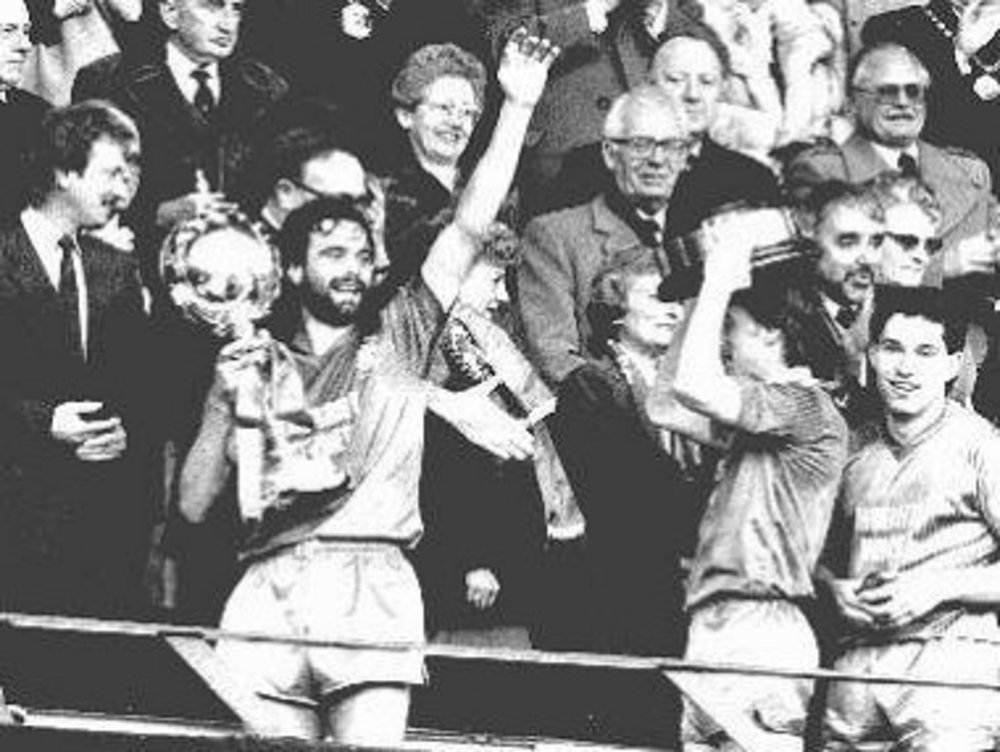
Paul Bowgett
And he enjoyed a tremendous amount of success with the Stones, despite suffering relegation and then promotion as Southern League champions.
He eventually left Wealdstone in the summer of 1988 after making over 450 appearances and scoring 65 goals, many of which were penalties.
Baldock Town approached him to take over as player-manager.
They had just been promoted to the Southern League Premier Division and the centre-back had a good couple of years until his back went and Ian Allinson
took over as boss - then it was off to home-town club Hitchin Town in the Isthmian Premier for another couple of years until, at the age of 38, he was playing for his local club, Stevenage Borough, under Paul Fairclough on their march up the Isthmian League.
The tenacious defender captained Boro during the 1991/92 campaign, picking up the players’ player of the year award for his efforts.
Then it was back to Baldock and then Arlesey Town for a final swansong.
Les Graham was renowned as a `crafty` inside forward in his playing days with a good goalscoring record.
After starting out with his home-town side Flixton as a youngster, Graham joined Blackburn Rovers in April 1947 when he was spotted playing for the Army in India.
He went on to make151 appearances for Rovers, scoring 42 goals, before transferring to Newport County in February 1953 for £2,500.
He played just over 100 times for County and scored 39 times before moving to Watford for £3,000 in June 1955.
Among his goals for the Hornets were two scored direct from corners on successive Saturdays, and his FA Cup total accrued mainly from his 5 in two games against non-League opposition.
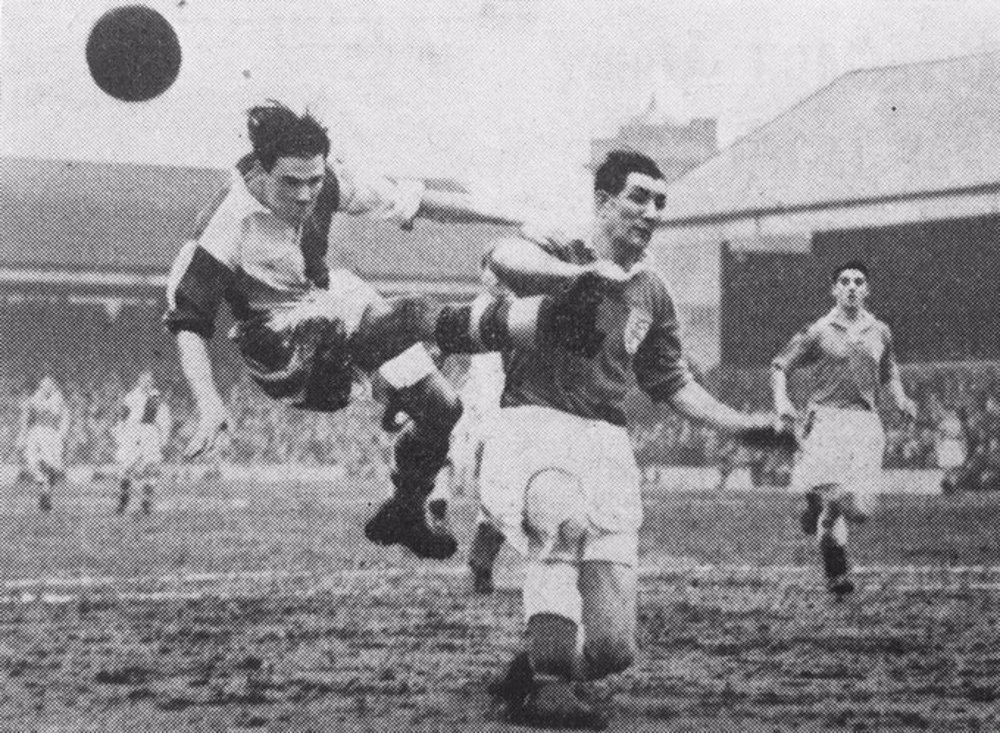
Les Graham (left)
After 90 games and 26 goals for Watford, in September 1957, Graham returned to Newport for £1,250 and he added 64 games and 15 goals to his tally.
He had a spell in the Southern League with Cambridge City in July 1957 until 1959 when he returned to Wales to take over as player-manager of Southern Division One outfit Merthyr Tydfil in 1959.
He helped the Martyrs to promotion to the Premier Division in his second season in charge and they had lower mid-table finishes until he left Penydarren Park in December 1963.
He managed Welsh League side Cwmbran Town and scouted for Tottenham Hotspur before becoming manager of his former club, Newport, from February 1967 until May 1969.
He passed away in 1998 at the age of 74.

Most clubs are looking for volunteers. Find out more on the button below:
www.PitchingInVolunteers.co.ukAll the news and results in one place.
REGISTER